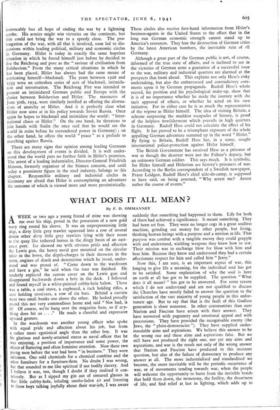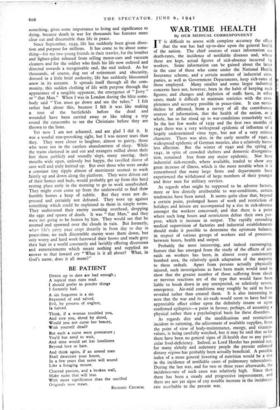WHAT DOES IT ALL MEAN ?
By F. D. OMMANNEY
AWEEK or two ago a young friend of mine was showing me over his ship, proud in the possession of a new gold wavy ring round his sleeve. It was an unprepossessing little ship, a dirty little grey trawler squeezed into a row of several dozen other dirty little grey trawlers lying with their noses to the quay like tethered horses in the dingy basin of an east- coast port. He showed me with obvious pride and affection the Lewis gun, the heavy naval gun mounted on the circular table in the bows, the depth-charges in their throwers in the stern, engines of death and destruction which he loved, under- stood and was proud of. " Come down to the wardroom and have a gin," he said when the tour was finished. He tenderly replaced the canvas cover on the Lewis gun and disappeared backwards down a hole in the deck. I followed and found myself in a white-painted cubby-hole below. There was a table, a coal stove, a cupboard, a rack holding rifles, a case holding revolvers, a row of tin hats. Behind a curtain were two small bunks one above the other. He looked proudly round this not very commodious home and said " Not bad, is it? Of course, we're bang over the magazine here, so if all- thing does hit us . . ." He made a cheerful and expressive upward gesture. In the wardroom was another young officer who spoke with equal pride and affection about his job, but from a rather more egotistical angle than the other boy. It was his glorious and newly-attained status as naval officer that he was enjoying, a position of importance and some power, the object of flattering and often feminine attention. Now these two young men before the war had been " in business." They were salesmen. One sold chemicals for a chemical combine and the other furniture for a furniture-firm. No doubt I was wrong, but that sounded to me like spiritual if not bodily slavery. And I believe it was, too, though I doubt if they realised it con- sciously. But as I sipped my gin out of smeared glasses in that little cubby-hole, inhaling smoke-laden air and listening to those boys talking joyfully about their war-job, I was aware suddenly that something had happened to them. Life for both of them had achieved a significance. It meant something. They had been set free. They were no longer cogs in a great soulless machine, grinding out money for other people, but living, thinking human beings with a purpose and a mission in life. That purpose was combat with a tangible enemy they could grapple with and understand, wielding weapons they knew how to use. Their mission was to exchange blow for blow with him and beat him. Because they knew and understood they had a certain affectionate respect for him and called him " Jerry."
Now this, I am sure, is an important aspect of war, this longing to give life a meaning, for the individual soul has got to be satisfied. Some explanation of why the soul is here on earth at all has got to be supplied. The question " What does it all mean? " has got to be answered. For some reason which I do not understand and am not qualified to discuss the Churches have mostly failed to answer the question to the satisfaction of the vast majority of young people in this unfor- tunate age. But to say that that is the fault of this Godless generation is sheer nonsense. In other communities than ours Nazism and Fascism have arisen with their answer. They have answered with pageantry and emotional appeal and with processions. They have provided the recognisable enemy (the Jews, the " pluto-democracies "). They have supplied under- standable aims and aspirations. We believe this answer to be the wrong one and these aims -and aspirations false. But we still have not produced the right one, nor yet any aims and aspirations, and war is the result not only of the wrong answer that Nazism and Fascism have produced to this insistent question, but also of the failure of democracy to produce any answer at all. The more industrialised and standardised we become, the more inevitable will be the periodic recurrence of war, or of movements tending towards war, when the people will welcome the opportunity to burst from the invisible bonds that hold them down, the monotony, the futility, the dreariness of life, and fmd relief at last in fighting, which adds up to something, gives some importance to living and significance to dying, because death in war for thousands has features more clear cut and discernible than life in peace.
Since September, 1939, life has suddenly been given direc- tion and purpose for millions. It has come to be about some- thing—for my two young friends in their trawler, for the bomber and fighter-pilot released from selling motor-cars and vacuum cleaners and for the soldier who finds his life now ordered and directed towards a recognisable end, the end indeed. As for thousands, of course, dug out of retirement and obscurity, dressed in a little brief authority, life has suddenly blossomed anew in its autumn. It spreads itself through all the com- munity, this sudden clothing of life with purpose through the appearance of a tangible opponent, the emergence of " Jerry " or " that Man." When I was in London during the blitz some- body said " You must go down and see the tubes." I felt rather bad about this, because I felt it was like making a tour of the battlefields before the dead and wounded have been carried away or like taking a trip round the catacombs to see the Christians before they are thrown to the lions.
Yet now I am not ashamed, and am glad I did it. It was a woeful tear-provoking sight, but I was nearer tears than they. They were closer to laughter, almost to gaiety, those who were not in the careless abandonment of sleep. While the trains clattered in and out and strangers milled about their feet these publicly and soundly . slept, many snoring, their mouths wide open, unlovely but happy, the ravelled sleeve of care well and truly knitted up. But over those who were awake a constant tiny ripple almost of merriment seemed to wash faintly up and down along the platform. They were driven out of their homes and beds, would probably get up from this hard resting place early in the morning to go to work unrefreshed. They might even come up from the underworld to find their humble homes a heap of rubble. But they were not de- pressed and certainly not defeated. They were up against something which could be explained to them in simple terms. They understood their enemy zooming overhead, dropping the eggs and spawn of death. It was " that Man," and they were not going to be beaten by him. They would see that he zoomed and spawned over the clouds in vain. But formerly, when life's petty pace crept drearily in from day to day in peace-time, no such discernible enemy wore them down, but only worry and hard work furrowed their brows and made grey their hair in a world constantly and lavishly offering diversions and entertainments which meant nothing and supplied no answer to that inward cry " What is it all about? What, in God's name, does it all mean?"



























 Previous page
Previous page